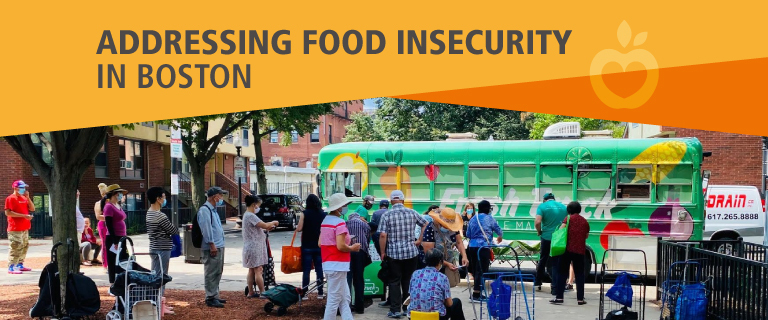
- On December 19, 2023
- In
Addressing Food Insecurity in Boston
IBA’s Commitment to Ending Hunger
Food insecurity is a pressing issue that affects Boston’s most vulnerable residents – but this is not a new problem for the city. As the Harvard Political Review points out, this issue goes hand in hand with systemic discrimination, which has historically limited the access to fresh produce and created food deserts for Black and Brown communities across Massachusetts.
Compounded by rising costs and the aftermath of COVID-19, the Greater Boston Food Bank reported an unprecedented demand for food assistance in September 2023. Although the state has one of the lowest aggregate poverty rates in the country, the U.S. Census Pulse Survey found that one in three Latinx households with children were food insecure. And as the recent ¡Avancemos Ya! report indicates, nearly one in four Latinos in Massachusetts lives below the federal poverty line. That is nearly 200,000 people.
In response to this crisis that largely affects the city’s Latinx population, IBA remains steadfast in its mission to alleviate hunger.. As food insecurity increases, IBA’s Resident Services Program (RSP) offers a variety of resources to create a future where no one in the city goes to bed hungry.
IBA’s Resident Services Program
By providing food access services and resources to over 1,200 low-income affordable housing community members, IBA directly combats food insecurity in vulnerable populations. With 48% Latinx residents, 27% Asian, 20% Black, and 5 % other, the organization’s efforts support a diverse population.
The following are some of the initiatives that benefit the community and support healthier lifestyles for IBA’s residents:
Farmers’ Market Coupon Program
To ensure inclusive access to fresh food, IBA combines household tracking with community-wide outreach to distribute Farmers’ Market coupons to those in need. Prioritizing senior residents and those with disabilities, the organization personalizes its outreach efforts to identify households that require food assistance. Using software to track participation, IBA provides equitable distribution of coupons and establishes a waitlist for interested participants.
Community-Wide Outreach
Through information kiosks, newsletters, social media, the IBA website, and community events, the organization spreads awareness about its programs. With materials in Cantonese, Spanish, and English, residents can access information and learn more about the quality food supplies available to them. This allows IBA to reach residents of all ages, abilities, languages, and education levels to ensure diversity and inclusion within the community.
Once registered, participants receive information about the program through phone, text, or email. However, it’s important to point out that the program also accepts walk-ins if extra coupons are available at the end of the month.
Strategic Partnerships
To expand its impact, IBA collaborates with the Copley Square, he Nubian Square Farmers Markets and specifically for the senior population Action for Boston Community Development. The organization also partners with food company Goya to provide families with 15 pounds of food during the holidays. These affiliations allow IBA to strengthen its food access services and provide residents with greater opportunities to enjoy fresh and nutritious food.
Health Assistance
As the Harvard article points out, lack of access to healthy goods “also causes Black and Brown communities to experience disproportionately bad health.” Higher rates of heart attack, diabetes, and high blood pressure create unfair disadvantages that promote economic disparity among people of color and low-income communities.
To help alleviate these issues, IBA’s RSP offers the following resident services:
Health workshops
Health screenings
Support for medical appointments
Fitness and exercise classes
A Holistic Approach to Food Insecurity
In addressing food insecurity, IBA recognizes that this is a multifaceted challenge. This is why the organization prioritizes inclusivity in its food services and health resources. To ensure equal access to fresh and nutritious food, IBA’s outreach efforts ensure tangible support for its diverse community. Visit the IBA Resident Services page to learn more about how the organization works toward a more equitable and food-secure future for all.
